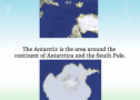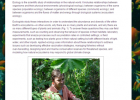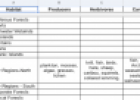Cargando...
Recursos educativos
-
Nivel educativo
-
Competencias
-
Tipología
-
Idioma
-
Tipo de medio
-
Tipo de actividad
-
Destinatarios
-
Tipo de audiencia
-
Creador
Lo más buscado
- Huerto escolar
- Animales dibujados para primero
- Aprender a bailar
- materiales para experimentos escolares
- Problemas multiplicativos
- Pasatiempos matemáticos
- Globoflexia
- Poemas infantiles
- Imprimir material segundo
- Actividades de repaso en segundo
- Actividades artisticas
- actividades ortografía
- Cáncer
- Juegos de dictado de palabras niños
- Cine
-

Trophic relationships in ecosystems
EduBook Organización
- 3169 visitas
4.1. Matter and energy in an ecosystem In an ecosystem, living things perform different functions in the process of production and transfer of matter and energy. They are divided into: Producers. These…
-

Summaries - The Plant Kingdom
EduBook Organización
- 3044 visitas
1. Plants Plants originated 500 million years ago from green algae in the sea. Plants are multicellular organisms with particular characteristics: They are held in place in the ground by roots. They are…
-

Animal habitat
Tiching explorer Organización
- 2 lo usan
- 4248 visitas
Lesson designed to help students learn about organisms and environments. Students classify animals by their habitat and complete research on a specific habitat. They locate a specific habitat on Google…
-

End-of-unit evaluation - The Animal Kingdom (I). Invertebrates
EduBook Organización
- 2888 visitas
Today our planet is home to a great variety of organisms. This is the result of an evolutionary process that began some 3.5 billion years ago. Invertebrates are a very diverse group of animals that do…
-

Unit 6: The natural environment. Ecosystems
EduBook Organización
- 2788 visitas
Abiotic (adj): relating to the environment, not living things. aquatic (adj): relating to water. biome (n): a large area of the Earth which has similar plant and animal populations. biosphere (n): the…
-

Ecology lab: Ecosystems
Tiching explorer Organización
- 4434 visitas
In this unit we can learn some questions that are central to the study of ecosystems (communities of living organisms in particular places and the chemical and physical factors that influence them). We…
-

Fungi and lichens
EduBook Organización
- 2615 visitas
6.1. Fungi Fungi are heterotrophic organisms (parasites or saprophytes) that have many different unicellular and multicellular forms: Mushrooms, which grow in forests and fields. Moulds, which grow on…
-

Lesson plan: History of life on Earth
Tiching explorer Organización
- 2 lo usan
- 3052 visitas
This resource shows us that by means of using Google Calendar and a research-based table listing the history of living organisms scaled down to a one year duration, students will collaborate to create a…
-

Food chains
Tiching explorer Organización
- 2 lo usan
- 3037 visitas
In this lesson students explore food chains and the order of organisms in a food chain. In groups they research on a habitat and placemark their habitat on Google Earth. Individually each student will…
-

Final self-evaluation 9.01 - The Plant Kingdom
EduBook Organización
- 2464 visitas
Are the following sentences true or false? Plants are autotrophic, multicellular organisms. The end products of photosynthesis are carbohydrates and carbon dioxide. All plants have vessels for…
Te estamos redirigiendo a la ficha del libro...













